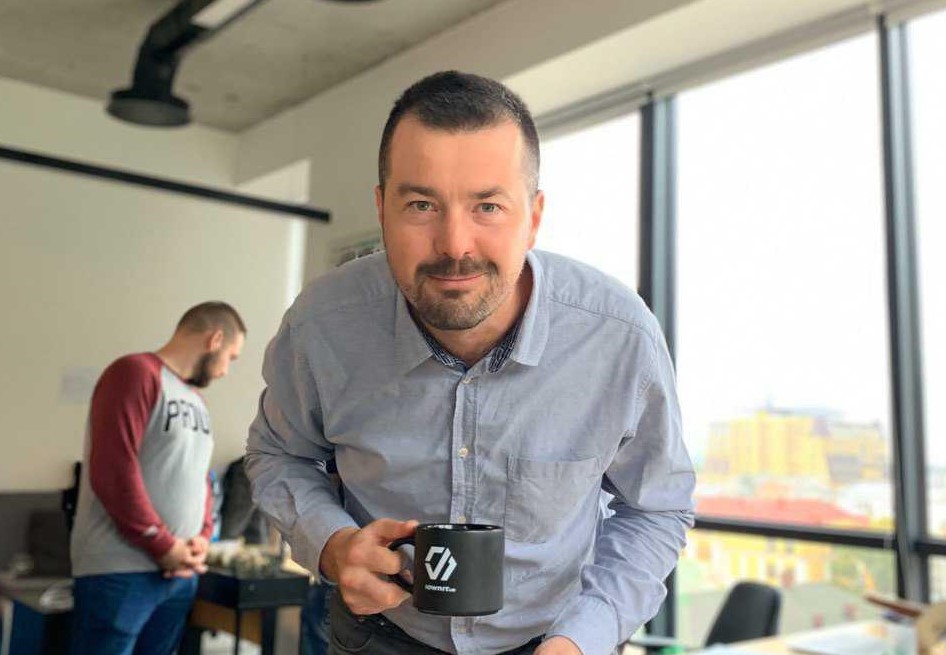
If you haven’t heard of iownit yet (which would be surprising), allow us to fix this right away.
lownit Capital and Markets, Inc. is a firm specializing in financial services and technology, which focuses on developing and implementing an innovative blockchain-based platform to raise capital. The team is dedicated to building a regulatory-compliant solution bringing modern technology to new segments of capital markets in the US and abroad.
This year Indigo and Iownit cooperated to strengthen the Iownit team with technical specialists. So we decided that this was a great opportunity for an open dialogue.
We spoke to Viktor Nikolenko, CTO at lownit, about the team, the culture and some of the inside processes at the company.
Viktor: Iownit is an online alternative trading system (ATS) in the US. The iownit trading system allows for the digitization of private securities.
Unlike public markets, like the New York Stock Exchange, private-market transactions are still completely analog. Private securities are investable assets that are not traded on public markets. iownit allows its users to invest into private securities through an experience that is similar to investing in public markets.
Our unique features are related to how we apply distributed ledger and smart investment contracts using the Hyperledger Fabric to capture and record transaction data to meet current US regulations.

Viktor: On a tech side majority of our positions are Software Engineers on AWS/Node/Angular/Typescript stack and manual/automation QAs. And of course some specialties, like Blockchain and AWS architects in our core team. Also we are extending our product team with a senior BA.
Viktor: At the moment we have offices in 3 countries: in the US (HQ in Houston, also in New York and Silicon Valley), Portugal (Lisbon) and Ukraine (Kyiv and Lviv).
Viktor: For the tech positions, (depending on the seniority of the position), we usually involve the CTO, and Development Leads, maybe a recruitment agency, when needed. The best sources, aside from recruitment agencies, are personal references and specialized portals like Djinni. Overall recruitment is a challenging process, and very time consuming, so we welcome all sources, like engagements through meetups and conferences.
Viktor: We are always happy to work with professional recruiters when we have a pool of open positions and also roadmap of when and how to grow the company needs. In other words — in phases of rapid growth, when we scale our teams, engaging with a staffing agency is quite important. Another case would be if we need a person with rare skill set, but that would probably mean that our choice of technologies wasn’t right 😉
Viktor: First of all, we pay attention to relevant tech experience and whether a candidate has a clear definition of their personal role in past projects, versus a generic description.
It’s also important to us that candidates are flexible in their choice of technologies: not just React or Angular developer, for instance, but a software engineer.
A short description of the candidate’s most important achievements is also a big plus, especially if the business value of their achievement is clearly defined.
Viktor: First, a brief high level intro interview with a few semi-tech questions, to understand overall level and adequacy of a candidate. Then a more detailed tech interview, with a focus on knowledge of various solutions for practical challenges, and only then their theoretical background. Questions for junior and senior positions tend to be at different levels.
Viktor: We have a test task, but we don’t ask candidates to write code, instead we give a sample code for review — this practice has proven to be more effective, as it requires less time from a candidate, while also allowing us to see a candidate’s code standards.
Viktor: For us it is important that a candidate is interested in our business domain and understands our product conceptually — this is why we always spend some time during the intro interview making sure that all candidates correctly understand our business vision and goals. Simultaneously we assess cultural and team fit for the candidate. Afterwards, we discuss motivation and an initial growth plan.
Our rules are simple — everyone from the interview team must approve. We try to get candidates to interact with several members from different teams/locations so that we get diverse internal feedback.
Viktor: Qualities validated during the interview process include: positive mindset, a “mature” personality and approach to life, honesty, making the effort to deliver. I believe that one’s personality manifests itself in two instances: when a person is relaxed or on the contrary — when they are under stress. Thus, when we are discussing some practical cases from a candidate’s experience and asking to explain how and why decisions were made — it shows a glimpse of their personality 😉 During the test period we determine if a candidate shows initiative, rather than demanding/blaming, can cooperate and understand others’ decisions and concerns in a productive way, confirms cultural fit and so on.
Viktor: Yes, we certainly do have interesting questions during our interviews. “The one” candidate is honest and sure about what they know and don’t know, and can explain their choices.
Viktor: Usually — yes. Mostly by supervising processes we use and by helping with the definitions of company values and vision. For any key positions, the CEO’s approval is required.
Viktor: Well, first of all — we try to keep our communication transparent and honest, and require this from everyone in our company.
On recruitment itself:
1) prepare clear and useful biz and tech description of what you need for recruiters, don’t bloat your job description with unnecessary skills and requirements;
2) allow tech candidates to talk to your tech leads as early as possible — this will gain their trust. If the recruiter did their job right — you will already have relevant candidates to talk to.
Viktor: One important advantage is that we were founded by business professionals from the US and our building technology matches our business vision and requirements, not vice-versa, as one often finds in startups trying to find a “market fit” for their “disruptive” tech ideas.
We have a decent knowledge of our business domain and use it to build innovative things on a very large and conservative market of private capital in the US.
We actively share this experience with our tech teams. As a result — our clients get priceless knowledge of how startups/companies should approach money raising and how investment processes function in the USA. The fact that we are focused on one product is attractive for many developers, tired of working in outsourcing “factories. ”
We have strict requirements for the quality of our platform — we make a strong effort to keep our tech culture on a high level, which appeals to tech talents looking for a similar-minded team.
Viktor: Small company — less procedures 😉 But we are already in a growth stage, so we have an onboarding plan for creating accounts, working place, hardware/software, development and user guides with overall and tech intros, mentoring and in-person intros, first pull requests and so on.
Viktor: I think productive work starts from clear biz requirements and cross-functional teams, with as few dependencies as possible. Given the complexity of our platform that’s not always possible, but we try our best 😉
Then the knowledge-sharing process — making sure that everyone has access to the information they need and can ask the right team/person.
We have remote and partially-remote employees, so communication processes and tools are quite/terribly important.
By choosing optimal, often paid services for the dev process, be it “Invision” for designers or “Sonar”/”Travis” for build verification, pays off with a shorter development cycle and a quicker time to the marketI afterall.
Viktor: User guides, Structured wiki for tech and business documentation, Internal meetups on the most requested topics, and code guidelines.
Also pull request reviews are important to distribute knowledge of the codebase.
Viktor: A clear understanding of each others’ roles and goals. Everyday updates on everyone’s progress, achievements and problems. And of course a supportive atmosphere — people tend to work better/more as a team when their results are evaluated as common achievements (and failures).
Viktor: Initially we lacked a decent pre-screening process, meaning we had too many “weak” or irrelevant candidates. Now during the first intro interview we have few questions to understand the overall level of the candidate.
Then code review as a practical task appeared to be a good response instead of too heavy or too boring code writing exercises. Choosing the right recruiter usually helps save some time and speed up the process 😉
Viktor: Not that many — mostly cross-team communication, given our different time-zones and responsibilities.
Viktor: One difference is that you can’t walk to everyone’s desk and talk to them in person, so you have to establish simple and effective communication tools and remote work culture. Otherwise you will have several companies, not teams.
Recommendations: find the right level of documentation for you, explicitly set your dev process rules (codestyle, analysis, review, deploy, etc). Make sure that there are no strong/urgent dependencies between different time zones — so cross-functional teams and automation over ping-pong style communication.








 Success!
Success! 